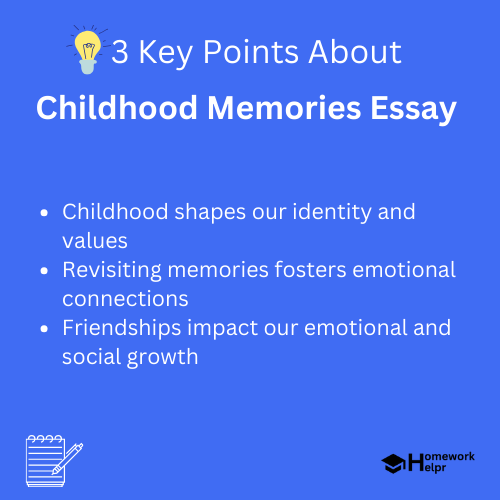📝 Summary
Childhood is a period of innocence and wonder, creating lasting memories that evoke joy and nostalgia. Childhood memories are essential for identity formation, emotional connections, and coping during tough times. They also reflect significant experiences like family gatherings, friendships, school adventures, and playtime activities. These memories help us learn valuable lessons and influence our adult lives. Reflecting on these memories can provide comfort and clarity, enriching our present while honoring the past.
Childhood Memories: A Treasure Trove of Joy
Childhood is a time filled with innocence and wonder, and our memories from this period often bring us moments of joy, nostalgia, and reflection. As we grow up, the experiences we had as children shape who we become as adults. In this essay, we will explore childhood memories, their significance in our lives, and some common experiences that many of us cherish.
The Importance of Childhood Memories
Childhood memories play a crucial role in our lives. They serve as a window through which we can revisit our past and assess what we have learned. Here are several reasons why childhood memories are important:
- Identity Formation: Our early experiences lay the groundwork for our personality and values.
- Emotional Connection: Revisiting happy memories can help us feel connected to family and friends.
- Coping Mechanism: Memories of joyful times can be a source of comfort during tough times.
- Life Lessons: Childhood experiences teach us valuable lessons about relationships, compassion, and resilience.
Definition
Identity Formation: The process of developing a distinct personality, including attitudes, values, and beliefs.
Examples
For instance, a child who spent time volunteering may carry a strong sense of empathy into adulthood, deeply affecting their relationships and career choices.
Types of Childhood Memories
Childhood memories can be categorized into various types based on the experiences we had. Here are some common types of memories:
- Family Memories: Time spent with family members can create lasting imprints, whether it’s a weekend picnic or holiday gatherings.
- Friendship Memories: Relationships with friends in childhood often lead to unforgettable adventures, pranks, and laughter.
- School Memories: From field trips to school plays, the classroom is a source of many memorable experiences.
- Playtime Memories: Whether it was riding bikes, playing tag, or imaginary games, play defines childhood.
Impact of Family on Childhood Memories
Our families are often the primary source of our childhood experiences. The love, support, and guidance we receive shape our memories and emotions. Families create a safe space where we can explore and learn. Bonding activities like cooking together, going on vacations, or celebrating birthdays are moments that often stand out in our memories.

Definition
Bonding Activities: Actions that help build connections and relationships among individuals, often involving shared experiences.
Examples
For example, a family camping trip can create cherished memories of adventure and togetherness, influencing how children perceive family time throughout their lives.
Friendships and Their Influence
Friendships formed in childhood are often the most profound. These bonds teach us about trust, kindness, and sharing. Our friends are the ones we adventure with, leading to exciting memories. Activities such as playing games, celebrating birthdays, and even overcoming conflicts contribute significantly to our lives.
❓Did You Know?
Did you know? Some psychologists believe that the friendships we form in childhood can predict the strength and stability of our relationships as adults!
Definition
Trust: A firm belief in the reliability, truth, or ability of someone, which is essential for strong relationships.
Examples
Consider a scenario where children create a club in school. The secrets shared and adventures taken together can foster trust and create strong friendships lasting into adulthood.
School Memories: The Learning Experience
School is a significant part of our childhood, providing an environment filled with opportunities for learning and growth. The teachers we had, the friends we made, and the subjects we loved (or hated) are all part of this puzzle.
Memorable experiences from school could include:
- Field trips to museums or parks that expand horizons.
- Sports events bringing together the community for cheering.
- School projects that spark creativity.
Definition
Creativity: The ability to generate new and original ideas or solve problems in novel ways.
Examples
For instance, participating in a science fair project teaches teamwork and sparks an interest in scientific exploration, forming memories that can influence future academic pursuits.
Playtime Memories: The Heart of Childhood
Play is essential for childhood development. It’s where children explore imagination, physical abilities, and social skills. Playtime activities create lasting memories, whether it‚’ playing dress-up, building forts, or engaging in sports.
Through play, children learn important lessons such as:
- Cooperation: Working together towards a common goal.
- Conflict Resolution: Navigating disagreements and finding solutions.
- Creativity: Thinking outside the box to devise new games or scenarios.
Conclusion
Childhood memories are a treasure trove that holds the essence of our early years. They shape our identity, foster emotional connections, and provide us with valuable lessons that stay with us throughout life. Whether it’s family gatherings, friendships, school experiences, or playful adventures, these memories remind us of the simple joys of life.
As we navigate adulthood, taking a moment to reflect on our childhood can bring comfort and clarity. By cherishing these memories, we not only honor our past but also enrich our present, leading to a future filled with wisdom and growth.
Related Questions on Childhood Memories Essay for Students and Children
What are the benefits of childhood memories?
Answer: They shape identity, offer emotional comfort, and teach life lessons.
How do family experiences influence childhood memories?
Answer: Families create a supportive environment that shapes important memories.
Why are friendships important during childhood?
Answer: They teach trust, cooperation, and conflict resolution.
What role does play have in childhood development?
Answer: Play enhances imagination, physical skills, and social interactions.
